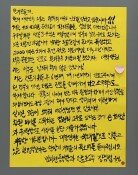[Opinion] Yellow Sand
Around the time the forsythias start to bloom, an uninvited guest also shows up. Strong winds hit the desert and the barren plateau in northwest China, stirring sand and dust into the air. In a day or two, the opaque brownish sand and dust are carried by the strong winds and swarm the air over the Korea Peninsula. Then it continues its journey by crossing the Pacific Ocean - which weakens the sand carrying winds with its clouds - the Rocky Mountains and reaches Mideastern U.S. The Americans call it the Asian dust, or as we know it, yellow sand.
Deserts comprise up to 17 percent of Chinese territory. Hot and humid air from South Asia rains over the Tibet Plateau and reaches northwest China and becomes dry. Hence, an enormous desert was created in the area. Furthermore, clearing the land, logging, and raising cattle have accelerated the growth of the already enormous desert. Annually, land three to four times the size of the city of Seoul is turning into desert. Even the Great Wall that fended off barbarians is helpless against the yellow sand. Beijing has suffered so much from the yellow sand that Chinese often argue that they should move the capital to a new location.
The yellow sand, however, does have some positive effects. It curbs global warming by deflecting solar energy and reduces the atmospheres temperature. Some observations indicate that it also neutralizes acid rain and acid soil. Nevertheless, overall, yellow sand is the most problematic natural disaster in Northeast Asia. According to a World Bank report, one out of four Chinese die due to diseases caused by air pollution. Korea and Japan are next on the list of yellow storm victims.
China is endeavoring tremendously to halt the desertification of its territory. It is an extremely difficult project of drawing water into rainless arid land and converting it into grassland and forests. Considering Chinas rapid economic growth and its population of 1.3 billion, maybe it will have great results. If Korea and Japan invest in the huge project of turning deserts into green, there might be synergy effects too. Lets not waste energy in covering the past history with lies, but unite to reduce Chinas dust.
Hwang Ho-taek, Editorial writer, hthwang@donga.com
Headline News
- Med professors announce intention to leave hospitals starting Thursday
- Bridge honoring Sgt. Moon Jae-sik unveiled in Pennsylvania
- Chief of Staff Chung tells presidential secretaries to stay away from politics
- US FTC bans noncompete agreements
- N. Korea launches cyberattacks on S. Korea's defense companies







